- Home
- Samuel Beckett
Three Novels Page 10
Three Novels Read online
Page 10
Answer.
Question. Would they not suspect the old man with the stick?
Answer. Very probably.
Question. What were his chances of exonerating himself?
Answer. Slight.
Question. Should I tell my son what had happened?
Answer. No, for then it would be his duty to denounce me.
Question. Would he denounce me?
Answer.
Question. How did I feel?
Answer. Much as usual.
Question. And yet I had changed and was still changing?
Answer. Yes.
Question. And in spite of this I felt much as usual?
Answer. Yes.
Question. How was this to be explained?
Answer.
These questions and others too were separated by more or less prolonged intervals of time not only from one another, but also from the answers appertaining to them. And the answers did not always follow in the order of the questions. But while looking for the answer, or the answers, to a given question, I found the answer, or the answers, to a question I had already asked myself in vain, in the sense that I had not been able to answer it, or I found another question, or other questions, demanding in their turn an immediate answer.
Translating myself now in imagination to the present moment, I declare the foregoing to have been written with a firm and even satisfied hand, and a mind calmer than it has been for a long time. For I shall be far away, before these lines are read, in a place where no one will dream of coming to look for me. And then Youdi will take care of me, he will not let me be punished for a fault committed in the execution of my duty. And they can do nothing to my son, rather they will commiserate with him on having had such a father, and offers of help and expressions of esteem will pour in upon him from every side.
So this third day wore away. And about five o’clock I ate my last tin of sardines and a few biscuits, with a good appetite. This left me with only a few apples and a few biscuits. But about seven o’clock my son arrived. The sun was low in the west. I must have dozed a moment, for I did not see him coming, a speck on the horizon, then rapidly bigger and bigger, as I had foreseen. But he was already between me and the camp, making for the latter, when I saw him. A wave of irritation broke over me, I jumped to my feet and began to vociferate, brandishing my umbrella. He turned and I beckoned him to join me, waving the umbrella as if I wanted to hook something with the handle. I thought for a moment he was going to defy me and continue on his way to the camp, to where the camp had been rather, for it was there no more. But finally he came towards me. He was pushing a bicycle which, when he had joined me, he let fall with a gesture signifying he could bear no more. Pick it up, I said, till I look at it. I had to admit it must once have been quite a good bicycle. I would gladly describe it, I would gladly write four thousand words on it alone. And you call that a bicycle? I said. Only half expecting him to answer me I continued to inspect it. But there was something so strange in his silence that I looked up at him. His eyes were starting out of his head. What’s the matter, I said, is my fly open? He let go the bicycle again. Pick it up, I said. He picked it up. What happened to you? he said. I had a fall, I said. A fall? he said. Yes, a fall, I cried, did you never have a fall? I tried to remember the name of the plant that springs from the ejaculations of the hanged and shrieks when plucked. How much did you give for it? I said. Four pounds, he said. Four pounds! I cried. If he had said two pounds or even thirty shillings I should have cried, Two pounds! or, Thirty shillings! the same. They asked four pounds five, he said. Have you the receipt? I said. He did not know what a receipt was. I described one. The money I spent on my son’s education and he did not know what a simple receipt was. But I think he knew as well as I. For when I said to him, Now tell me what a receipt is, he told me very prettily. I really did not care in the least whether he had been fooled into paying for the bicycle three or four times what it was worth or whether on the other hand he had appropriated the best part of the purchase money for his own use. The loss would not be mine. Give me the ten shillings, I said. I spent them, he said. Enough, enough. He began explaining that the first day the shops had been closed, that the second—. I said, Enough, enough. I looked at the carrier. It was the best thing about that bicycle. It and the pump. Does it go by any chance? I said. I had a puncture two miles from Hole, he said, I walked the rest of the way. I looked at his shoes. Pump it up, I said. I held the bicycle. I forget which wheel it was. As soon as two things are nearly identical I am lost. The dirty little twister was letting the air escape between the valve and the connexion which he had purposely not screwed tight. Hold the bicycle, I said, and give me the pump. The tyre was soon hard. I looked at my son. He began to protest. I soon put a stop to that. Five minutes later I felt the tyre. It was as hard as ever. I cursed him. He took a bar of chocolate from his pocket and offered it to me. I took it. But instead of eating it, as I longed to, and although I have a horror of waste, I cast it from me, after a moment’s hesitation, which I trust my son did not notice. Enough. We went down to the road. It was more like a path. I tried to sit down on the carrier. The foot of my stiff leg tried to sink into the ground, into the grave. I propped myself up on one of the bags. Keep her steady, I said. I was still too low. I added the other. Its bulges dug into my buttocks. The more things resist me the more rabid I get. With time, and nothing but my teeth and nails, I would rage up from the bowels of the earth to its crust, knowing full well I had nothing to gain. And when I had no more teeth, no more nails, I would dig through the rock with my bones. Here then in a few words is the solution I arrived at. First the bags, then my son’s raincoat folded in four, all lashed to the carrier and the saddle with my son’s bits of string. As for the umbrella, I hooked it round my neck, so as to have both hands free to hold on to my son by the waist, under the armpits rather, for by this time my seat was higher than his. Pedal, I said. He made a despairing effort, I can well believe it. We fell. I felt a sharp pain in my shin. I was all tangled up in the back wheel. Help! I cried. My son helped me up. My stocking was torn and my leg bleeding. Happily it was the sick leg. What would I have done, with both legs out of action? I would have found a way. It was even perhaps a blessing in disguise. I was thinking of phlebotomy of course. Are you all right? I said. Yes, he said. He would be. With my umbrella I caught him a smart blow on the hamstrings, gleaming between the leg of his shorts and his stocking. He cried out. Do you want to kill us? I said. I’m not strong enough, he said, I’m not strong enough. The bicycle was all right apparently, the back wheel slightly buckled perhaps. I at once saw the error I had made. It was to have settled down in my seat, with my feet clear of the ground, before we moved off. I reflected. We’ll try again, I said. I can’t, he said. Don’t try me too far, I said. He straddled the frame. Start off gently when I tell you, I said. I got up again behind and settled down in my seat, with my feet clear of the ground. Good. Wait till I tell you, I said. I let myself slide to one side till the foot of my good leg touched the ground. The only weight now on the back wheel was that of my sick leg, cocked up rigid at an excruciating angle. I dug my fingers into my son’s jacket. Go easy, I said. The wheels began to turn. I followed, half dragged, half hopping. I trembled for my testicles which swing a little low. Faster! I cried. He bore down on the pedals. I bounded up to my place. The bicycle swayed, righted itself, gained speed. Bravo! I cried, beside myself with joy. Hurrah! cried my son. How I loathe that exclamation! I can hardly set it down. He was as pleased as I, I do believe. His heart was beating under my hand and yet my hand was far from his heart. Happily it was downhill. Happily I had mended my hat, or the wind would have blown it away. Happily the weather was fine and I no longer alone. Happily, happily.
In this way we came to Ballyba. I shall not tell of the obstacles we had to surmount, the fiends we had to circumvent, the misdemeanours of the son, the disintegrations of the father. It was my intention, almost my desire, to tell of all these things, I rejoiced
at the thought that the moment would come when I might do so. Now the intention is dead, the moment is come and the desire is gone. My leg was no better. It was no worse either. The skin had healed. I would never have got there alone. It was thanks to my son. What? That I got there. He often complained of his health, his stomach, his teeth. I gave him some morphine. He looked worse and worse. When I asked him what was wrong he could not tell me. We had trouble with the bicycle. But I patched it up. I would not have got there without my son. We were a long time getting there. Weeks. We kept losing our way, taking our time. I still did not know what I was to do with Molloy, when I found him. I thought no more about it. I thought about myself, much, as we went along, sitting behind my son, looking over his head, and in the evening, when we camped, while he made himself useful, and when he went away, leaving me alone. For he often went away, to spy out the lie of the land and to buy provisions. I did practically nothing any more. He took good care of me, I must say. He was clumsy, stupid, slow, dirty, untruthful, deceitful, prodigal, unfilial, but he did not abandon me. I thought much about myself. That is to say I often took a quick look at myself, closed my eyes, forgot, began again. We took a long time getting to Ballyba, we even got there without knowing it. Stop, I said to my son one day. I had just caught sight of a shepherd I liked the look of. He was sitting on the ground stroking his dog. A flock of black shorn sheep strayed about them, unafraid. What a pastoral land, my God. Leaving my son on the side of the road I went towards them, across the grass. I often stopped and rested, leaning on my umbrella. The shepherd watched me as I came, without getting up. The dog too, without barking. The sheep too. Yes, little by little, one by one, they turned and faced me, watching me as I came. Here and there faint movements of recoil, a tiny foot stamping the ground, betrayed their uneasiness. They did not seem timid, as sheep go. And my son of course watched me as I went, I felt his eyes in my back. The silence was absolute. Profound in any case. All things considered it was a solemn moment. The weather was divine. It was the close of day. Each time I stopped I looked about me. I looked at the shepherd, the sheep, the dog and even at the sky. But when I moved I saw nothing but the ground and the play of my feet, the good one springing forward, holding back, setting itself down, waiting for the other to come up. I came finally to a halt about ten paces from the shepherd. There was no use going any further. How I would love to dwell upon him. His dog loved him, his sheep did not fear him. Soon he would rise, feeling the falling dew. The fold was far, far, he would see from afar the light in his cot. Now I was in the midst of the sheep, they made a circle round me, their eyes converged on me. Perhaps I was the butcher come to make his choice. I took off my hat. I saw the dog’s eyes following the movement of my hand. I looked about me again incapable of speech. I did not know how I would ever be able to break this silence. I was on the point of turning away without having spoken. Finally I said, Ballyba, hoping it sounded like a question. The shepherd drew the pipe from his mouth and pointed the stem at the ground. I longed to say, Take me with you, I will serve you faithfully, just for a place to lie and a little food. I had understood, but without seeming to I suppose, for he repeated his gesture, pointing the stem of his pipe at the ground, several times. Bally, I said. He raised one hand, it wavered an instant as if over a map, then stiffened. The pipe still smoked faintly, the smoke hung blue in the air an instant, then vanished. I looked in the direction indicated. The dog too. We were all three turned to the north. The sheep were losing interest in me. Perhaps they had understood. I heard them straying about again and grazing. I distinguished at last, at the limit of the plain, a dim glow, the sum of countless points of light blurred by the distance, I thought of Juno’s milk. It lay like a faint splash on the sharp dark sweep of the horizon. I gave thanks for evening that brings out the lights, the stars in the sky and on earth the brave little lights of men. By day the shepherd would have raised his pipe in vain, towards the long clear-cut commissure of earth and sky. But now I felt the man turning towards me again, and the dog, and the man drawing on his pipe again, in the hope it had not gone out. And I knew I was all alone gazing at that distant glow that would get brighter and brighter, I knew that too, then suddenly go out. And I did not like the feeling of being alone, with my son perhaps, no, alone, spellbound. And I was wondering how to depart without self-loathing or sadness, or with as little as possible, when a kind of immense sigh all round me announced it was not I who was departing, but the flock. I watched them move away, the man in front, then the sheep, huddled together, their heads sunk, jostling one another, breaking now and then into a little trot, snatching blindly without stopping a last mouthful from the earth, and last of all the dog, jauntily, waving his long black plumy tail, though there was no one to witness his contentment, if that is what it was. And so in perfect order, the shepherd silent and the dog unneeded, the little flock departed. And so no doubt they would plod on, until they came to the stable or the fold. And there the shepherd stands aside to let them pass and he counts them as they go by, though he knows not one is missing. Then he turns towards his cottage, the kitchen-door is open, the lamp is burning, he goes in and sits down at the table, without taking off his hat. But the dog stops at the threshold, not knowing whether he may go in or whether he must stay out, all night.
That night I had a violent scene with my son. I do not remember about what. Wait, it may be important.
No, I don’t know. I have had so many scenes with my son. At the time it must have seemed a scene like any other, that’s all I know.
I must have got the better of it as I always did, thanks to my infallible technique, and brought him unerringly to a proper sense of his iniquities. But the next day I realized my mistake. For waking early I found myself alone, in the shelter, I who was always the first to wake. And what is more my instinct told me I had been alone for some considerable time, my breath no longer mingling with the breath of my son, in the narrow shelter he had erected, under my supervision. Not that the fact of his having disappeared with the bicycle, during the night or with the first guilty flush of dawn, was in itself a matter for grave anxiety. And I would have found excellent and honourable reasons for this, if this had been all. Unfortunately he had taken his knapsack and his raincoat. And there remained nothing in the shelter, nor outside the shelter, belonging to him, absolutely nothing. And this was not yet all, for he had left with a considerable sum of money, he who was only entitled to a few pence from time to time, for his savings-box. For since he had been in charge of everything, under my supervision of course, and notably of the shopping, I was obliged to place a certain reliance on him in the matter of money. And he always had a far greater sum in his pocket than was strictly necessary. And in order to make all this sound more likely I shall add what follows.
1. I desired him to learn double-entry book-keeping and had instructed him in its rudiments.
2. I could no longer be bothered with these wretched trifles which had once been my delight.
3. I had told him to keep an eye out, on his expeditions, for a second bicycle, light and inexpensive. For I was weary of the carrier and I also saw the day approaching when my son would no longer have the strength to pedal for the two of us. And I believed I was capable, more than that, I knew I was capable, with a little practice, of learning to pedal with one leg. And then I would resume my rightful place, I mean in the van. And my son would follow me. And then the scandal would cease of my son’s defying me, and going left when I told him right, or right when I told him left, or straight on when I told him right or left as he had been doing of late, more and more frequently.
That is all I wished to add.
But on examining my pocket-book I found it contained no more than fifteen shillings, which led me to the conclusion that my son had not been content with the sum already in his possession, but had gone through my pockets, before he left, while I slept. And the human breast is so bizarre that my first feeling was of gratitude for his leaving me this little sum, enough to keep me going un
til help arrived, and I saw in this a kind of delicacy!
I was therefore alone, with my bag, my umbrella (which he might easily have taken too) and fifteen shillings, knowing myself coldly abandoned, with deliberation and no doubt premeditation, in Ballyba it is true, if indeed I was in Ballyba, but still far from Bally. And I remained for several days, I do not know how many, in the place where my son had abandoned me, eating my last provisions (which he might easily have taken too), seeing no living soul, powerless to act, or perhaps strong enough at last to act no more. For I had no illusions, I knew that all was about to end, or to begin again, it little mattered which, and it little mattered how, I had only to wait. And on and off, for fun, and the better to scatter them to the winds, I dallied with the hopes that spring eternal, childish hopes, as for example that my son, his anger spent, would have pity on me and come back to me! Or that Molloy, whose country this was, would come to me, who had not been able to go to him, and grow to be a friend, and like a father to me, and help me do what I had to do, so that Youdi would not be angry with me and would not punish me! Yes, I let them spring within me and grow in strength, brighten and charm me with a thousand fancies, and then I swept them away, with a great disgusted sweep of all my being, I swept myself clean of them and surveyed with satisfaction the void they had polluted. And in the evening I turned to the lights of Bally, I watched them shine brighter and brighter, then all go out together, or nearly all, foul little flickering lights of terrified men. And I said, To think I might be there now, but for my misfortune! And with regard to the Obidil, of whom I have refrained from speaking, until now, and whom I so longed to see face to face, all I can say with regard to him is this, that I never saw him, either face to face or darkly, perhaps there is no such person, that would not greatly surprise me. And at the thought of the punishments Youdi might inflict upon me I was seized by such a mighty fit of laughter that I shook, with mighty silent laughter and my features composed in their wonted sadness and calm. But my whole body shook, and even my legs, so that I had to lean against a tree, or against a bush, when the fit came on me standing, my umbrella being no longer sufficient to keep me from falling. Strange laughter truly, and no doubt misnamed, through indolence perhaps, or ignorance. And as for myself, that unfailing pastime, I must say it was far now from my thoughts. But there were moments when it did not seem so far from me, when I seemed to be drawing towards it as the sands towards the wave, when it crests and whitens, though I must say this image hardly fitted my situation, which was rather that of the turd waiting for the flush. And I note here the little beat my heart once missed, in my home, when a fly, flying low above my ash-tray, raised a little ash, with the breath of its wings. And I grew gradually weaker and weaker and more and more content. For several days I had eaten nothing. I could probably have found blackberries and mushrooms, but I had no wish for them. I remained all day stretched out in the shelter, vaguely regretting my son’s raincoat, and I crawled out in the evening to have a good laugh at the lights of Bally. And though suffering a little from wind and cramps in the stomach I felt extraordinarily content, content with myself, almost elated, enchanted with my performance. And I said, I shall soon lose consciousness altogether, it is merely a question of time. But Gaber’s arrival put a stop to these frolics.

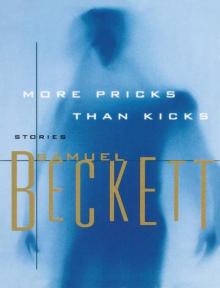 More Pricks Than Kicks
More Pricks Than Kicks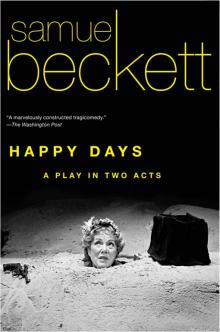 Happy Days
Happy Days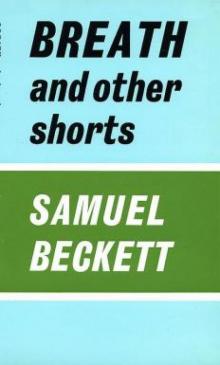 Breath, and Other Shorts
Breath, and Other Shorts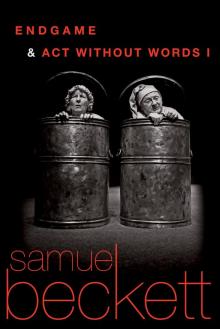 Endgame & Act Without Words
Endgame & Act Without Words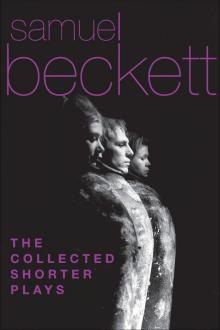 The Collected Shorter Plays of Samuel Beckett
The Collected Shorter Plays of Samuel Beckett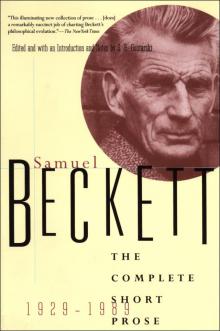 The Complete Short Prose, 1929-1989
The Complete Short Prose, 1929-1989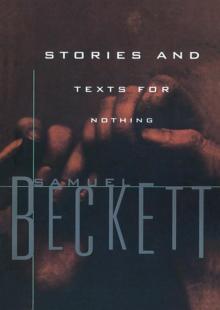 Stories and Texts for Nothing
Stories and Texts for Nothing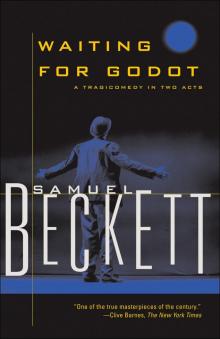 Waiting for Godot
Waiting for Godot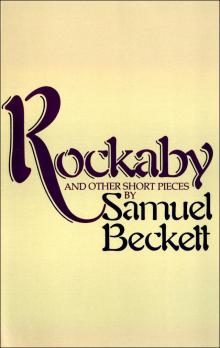 Rockaby and Other Short Pieces
Rockaby and Other Short Pieces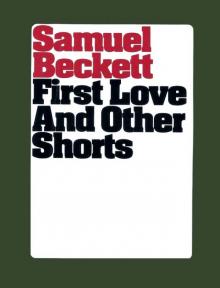 First Love and Other Shorts
First Love and Other Shorts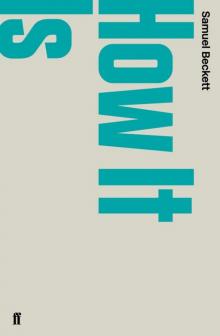 How It Is
How It Is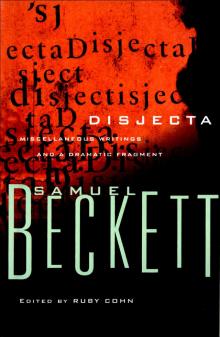 Disjecta: Miscellaneous Writings and a Dramatic Fragment
Disjecta: Miscellaneous Writings and a Dramatic Fragment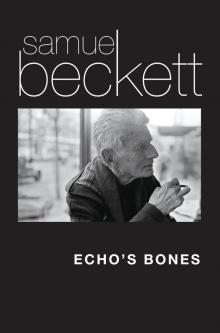 Echo's Bones
Echo's Bones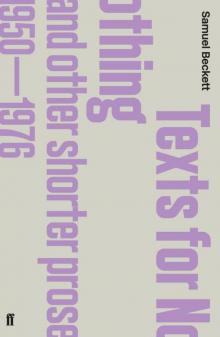 Texts for Nothing and Other Shorter Prose 1950-1976
Texts for Nothing and Other Shorter Prose 1950-1976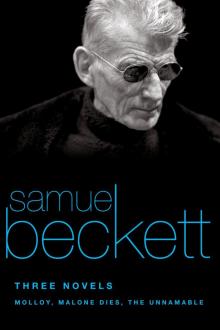 Three Novels
Three Novels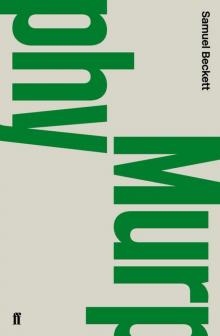 Murphy
Murphy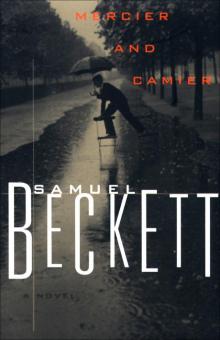 Mercier and Camier
Mercier and Camier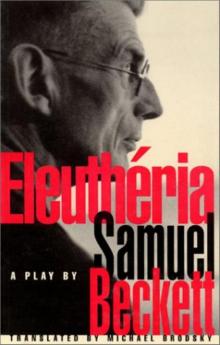 Eleuthéria
Eleuthéria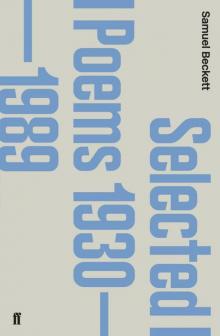 Selected Poems 1930-1988
Selected Poems 1930-1988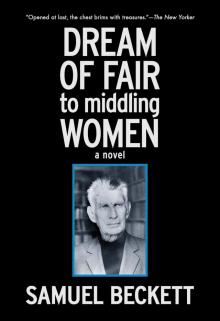 Dream of Fair to Middling Women
Dream of Fair to Middling Women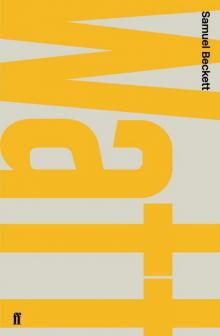 Watt
Watt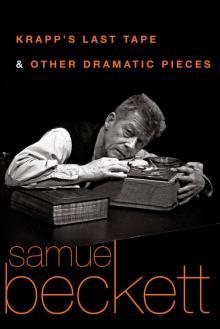 Krapp's Last Tape and Other Dramatic Pieces
Krapp's Last Tape and Other Dramatic Pieces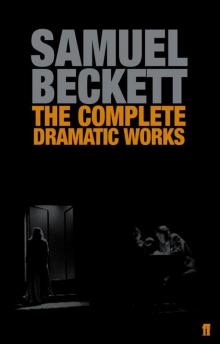 The Complete Dramatic Works of Samuel Beckett
The Complete Dramatic Works of Samuel Beckett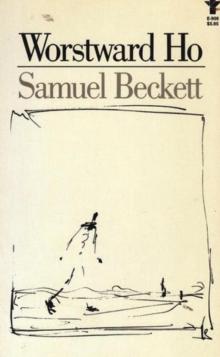 Worstward Ho
Worstward Ho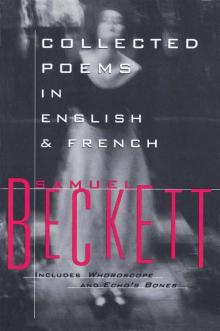 Collected Poems in English and French
Collected Poems in English and French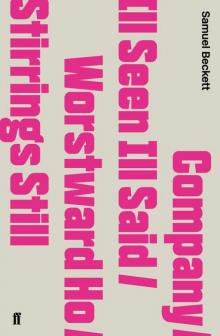 Company / Ill Seen Ill Said / Worstward Ho / Stirrings Still
Company / Ill Seen Ill Said / Worstward Ho / Stirrings Still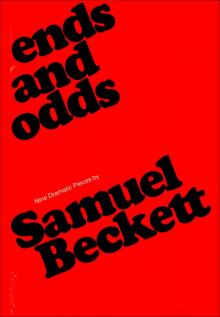 Ends and Odds
Ends and Odds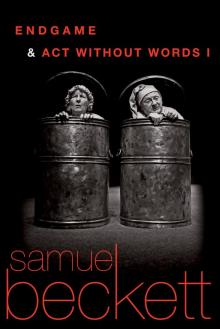 Endgame Act Without Words I
Endgame Act Without Words I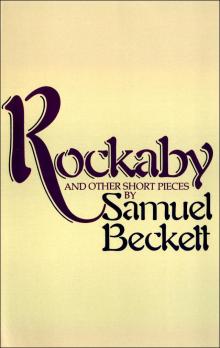 Rockabye and Other Short Pieces
Rockabye and Other Short Pieces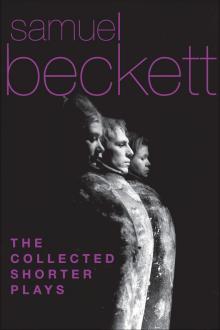 The Collected Shorter Plays
The Collected Shorter Plays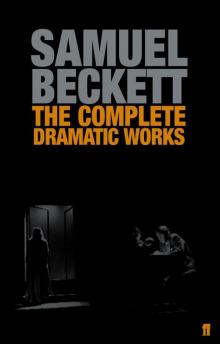 The Complete Dramatic Works
The Complete Dramatic Works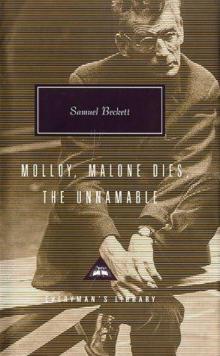 Three Novels: Malloy, Malone Dies, The Unnamable
Three Novels: Malloy, Malone Dies, The Unnamable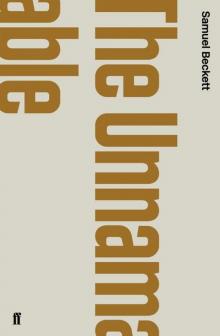 The Unnamable
The Unnamable